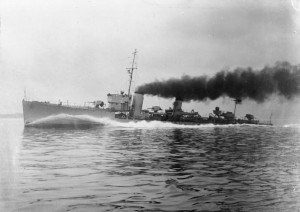Victory at Sea: The British Navy 1914 – 1918
 Understandably, the media presentations and TV commentries to mark the 100th anniversary of the Great War have concentrated on the land battles fought in Flanders. Nothing matches the horror of Paschendale. But the part played by the Royal Navy was the equivalent of the Battles of Britain and the Atlantic fought in the Second World War rolled into one.
Understandably, the media presentations and TV commentries to mark the 100th anniversary of the Great War have concentrated on the land battles fought in Flanders. Nothing matches the horror of Paschendale. But the part played by the Royal Navy was the equivalent of the Battles of Britain and the Atlantic fought in the Second World War rolled into one.
No great sea engagement comparable to Nelson’s victory at Trafalgar took place to fire popular imagination. The Battle of Jutland in May 1916 was indecisive, but crucially the German surface fleet broke off the engagement and retreated back to the Baltic, never to break out again during the course of the war. Indeed, it refused when asked to do so in 1918.
It is true that the government had to face serious attempts at mutiny over the course of the war, but so did Germany. There were sporadic outbursts of indiscipline in the British fleet up until 1931. However, mutiny in the British fleet was of a different order to those in the German navy. In Germany, mutiny had an ideological, revolutionary core, whilst insubordination in the British navy was more practically focussed on achieving better pay, food and living conditions. British seamen did not want to hang their officers, but their German counterparts were only too willing to do so. In kind, the German government attempted to deal with mutineers by shooting them. The British preferred to arrest ringleaders, try them by due process of military law, and impose long military sentences. Hanging was rare and usually commuted to terms of imprisonment. Legitimate complaints were recognised. Between 1914 – 1918, pay in the Royal Navy was raised by 200%, whilst food and living standards aboard ship were greatly improved. In short, the Royal Navy was able to maintain just enough elan and fighting capacity to remain operational in the last, crucial six months of 1918, cutting off Germany from vital supplies when their troops were being transferred from the Eastern Front just before the arrival of American armies to the west.
The naval blockade of the Baltic was never seriously broken, preventing food and war material from reaching Germany. This was a vital factor in the demoralisation and physical exhaustion of German troops at the front in June – November 1918. Germany was never able to capitalise on their initial breakthrough on the Western Front, having neither the material or the will to do so. This was really the major, if perhaps unspectacular, achievement of the British Navy.
The British North Sea ports were free to receive American troops, food and raw materials unhindered in the crucial final stages of the war. Britain was able to ship American re-enforcements to Flanders just in time to counter the transfer of German divisions from the Russian front after the signing of the Treaty of Brest Litovsk in May 1918. The British Navy ensured that the Herculean efforts of the home front in producing tanks, shells and aeroplanes and then shipping them safely across the channel to the battlefronts enabled commanders to concentrate firepower precisely and overwhelmingly, thus transferring defeat into final victory.